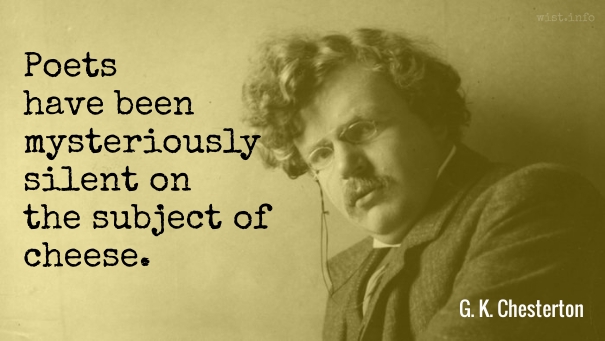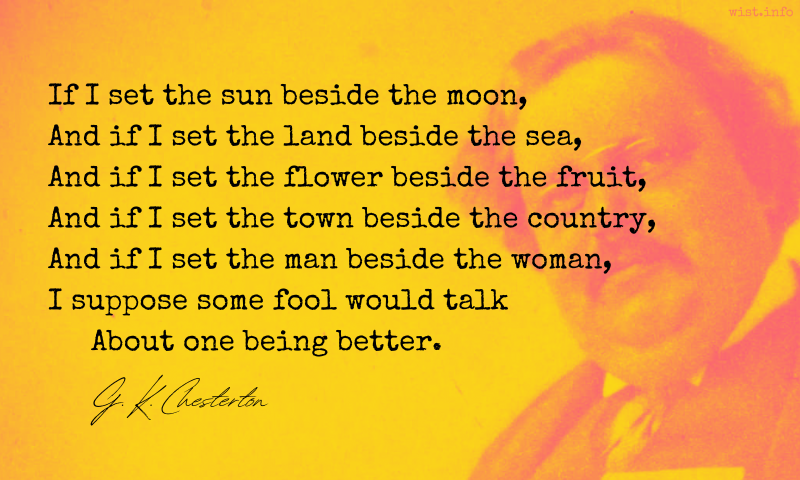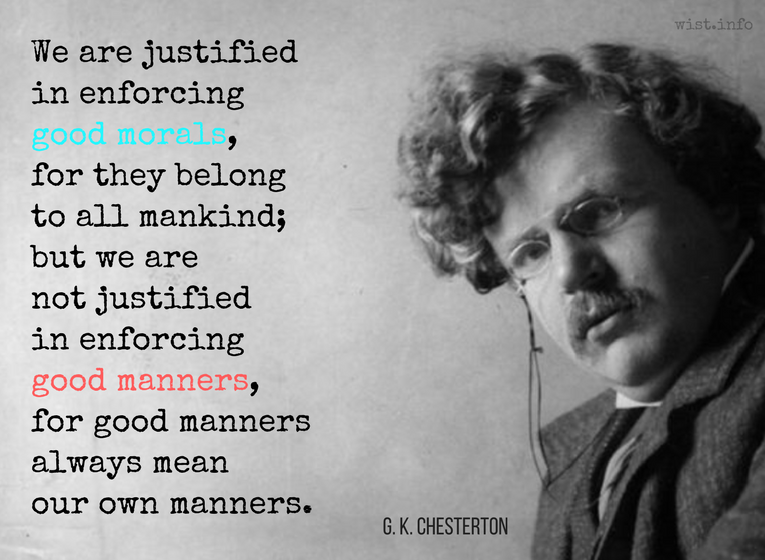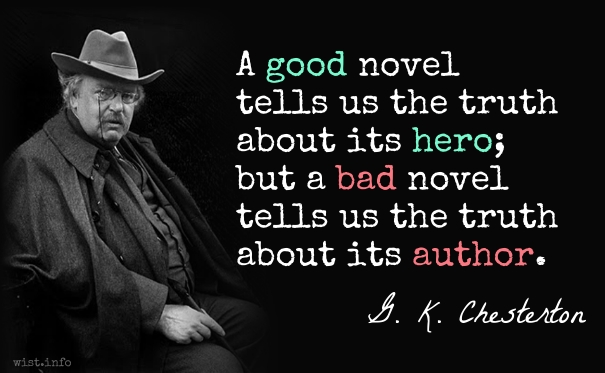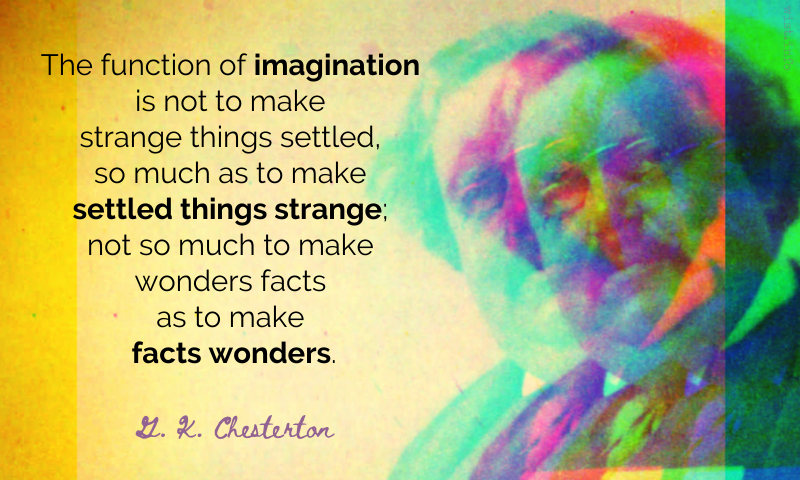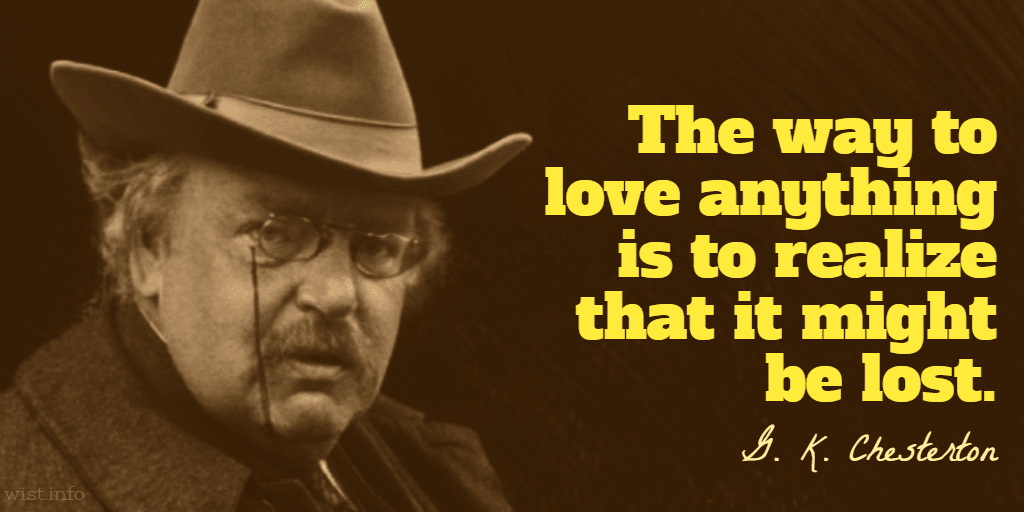There is a road from the eye to the heart that does not go through the intellect. Men do not quarrel about the meaning of sunsets; they never dispute that the hawthorn says the best and wittiest thing about the spring.
Gilbert Keith Chesterton (1874-1936) English journalist and writer
“A Defence of Heraldry,” The Defendant (1901)
(Source)
Quotations by:
Chesterton, Gilbert Keith
There are two ways of dealing with nonsense in this world. One way is to put nonsense in the right place; as when people put nonsense into nursery rhymes. The other is to put nonsense in the wrong place; as when they put it into educational addresses, psychological criticisms, and complaints against nursery rhymes or other normal amusements of mankind.
If I set the sun beside the moon,
And if I set the land beside the sea,
And if I set the flower beside the fruit,
And if I set the town beside the country,
And if I set the man beside the woman,
I suppose some fool would talk
About one being better.Gilbert Keith Chesterton (1874-1936) English journalist and writer
“Comparisons”
(Source)
In "The Notebook" (1894-98). BL MS Add. 73334, fo. 5.
The poem, which has no formal title, has been printed in multiple forms. In many cases, the third line (flower/fruit) is omitted. In some cases "tower" is substituted for "town."
The modern world seems to have no notion of preserving different things side by side, of allowing its proper and proportionate place to each, of saving the whole varied heritage of culture. It has no notion except that of simplifying something by destroying nearly everything.
The first fact about the celebration of a birthday is that it is a way of affirming defiantly, and even flamboyantly, that it is a good thing to be alive.
Gilbert Keith Chesterton (1874-1936) English journalist and writer
“Our Birthday,” G. K.’s Weekly (1935-03-21)
(Source)
Art, like morality, consists of drawing the line somewhere.
Gilbert Keith Chesterton (1874-1936) English journalist and writer
“Our Note Book,” Illustrated London News (5 May 1928)
Often misattributed to Oscar Wilde (and as "Morality, like art ..."). For more info, see here.
Real education precisely consists in the fact that we see beyond the symbols and the mere machinery of the age in which we find ourselves: education precisely consists in the realization of a permanent simplicity that abides behind all civilizations, the life that is more than meat, the body that is more than raiment. The only object of education is to make us ignore mere schemes of education. Without education, we are in a horrible and deadly danger of taking educated people seriously.
Gilbert Keith Chesterton (1874-1936) English journalist and writer
“Our Note Book,” The Illustrated London News (1905-12-02)
(Source)
Unless a thing is dignified, it cannot be undignified. Why is it funny that a man should sit down suddenly in the street? There is only one possible or intelligent reason: that man is the image of God. It is not funny that anything else should fall down; only that a man should fall down. No one sees anything funny in a tree falling down. No one sees a delicate absurdity in a stone falling down. No man stops in the road and roars with laughter at the sight of the snow coming down. The fall of thunderbolts is treated with some gravity. The fall of roofs and high buildings is taken seriously. It is only when a man tumbles down that we laugh. Why do we laugh? Because it is a grave religious matter: it is the Fall of Man. Only man can be absurd: for only man can be dignified.
Gilbert Keith Chesterton (1874-1936) English journalist and writer
“Spiritualism,” All Things Considered (1908)
(Source)
It is assumed that the skeptic has no bias; whereas he has a very obvious bias in favor of skepticism.
Gilbert Keith Chesterton (1874-1936) English journalist and writer
“The Error of Impartiality,” All Things Considered (1908)
(Source)
I know that journalism largely consists in saying, “Lord Jones Dead” to people who never knew that Lord Jones was alive.
Gilbert Keith Chesterton (1874-1936) English journalist and writer
“The Purple Wig,” The Wisdom of Father Brown (1914)
(Source)
While the quoted phrase uses a headline style, omitting the article, the vast majority of copies of it read "Lord Jones is dead." Other paraphrases:
- "Journalism is there to tell us Jones is dead, even though it didn’t tell us he was alive."
- "Journalism is the art of making interesting the fact that Lady Jones is dead , even to those who had never known that she was alive."
- "Our business of news is telling the world that Lord Jones is dead when most of us did not even know he was alive."
We have all heard enough to fill a book about Dr. Johnson’s incivilities. I wish they would compile another book consisting of Dr. Johnson’s apologies. There is no better test of a man’s ultimate chivalry and integrity than how he behaves when he is wrong; and Johnson behaved very well. He understood (what so many faultlessly polite people do not understand) that a stiff apology is a second insult. He understood that the injured party does not want to be compensated because he has been wronged; he wants to be healed because he has been hurt.
But among the Very Rich you will never find a really generous man even by accident. They may give their money away, but they will never give themselves away; they are egotistic, secretive, dry as old bones. To be smart enough to get all that money you must be dull enough to want it.
Gilbert Keith Chesterton (1874-1936) English journalist and writer
A Miscellany of Men, “The Miser and His Friends” (1912)
(Source)
In a similar vein, in "The Paradise of Thieves," The Wisdom of Father Brown (1914), Chesterton has the character Muscari say:
To be clever enough to get all that money,
one must be stupid enough to want it.
We are justified in enforcing good morals, for they belong to all mankind; but we are not justified in enforcing good manners, for good manners always mean our own manners.
Gilbert Keith Chesterton (1874-1936) English journalist and writer
All Things Considered, “Limericks and Counsels of Perfection” (1908)
(Source)
It is not only possible to say a great deal in praise of play; it is really possible to say the highest things in praise of it. It might reasonably be maintained that the true object of all human life is play. Earth is a task garden; heaven is a playground. To be at last in such secure innocence that one can juggle with the universe and the stars, to be so good that one can treat everything as a joke — that may be, perhaps, the real end and final holiday of human souls.
Gilbert Keith Chesterton (1874-1936) English journalist and writer
All Things Considered, “Oxford from Without” (1908)
Full text.
Bowing down in blind credulity, as is my custom, before mere authority and the tradition of the elders, superstitiously swallowing a story I could not test at the time by experiment or private judgment, I am firmly of the opinion that I was born on the 29th of May, 1874, on Campden Hill, Kensington ….
The wise old fairy tales never were so silly as to say that the prince and the princess lived peacefully ever afterwards. The fairy tales said that the prince and the princess lived happily, and so they did. They lived happily, although it is very likely that from time to time they threw the furniture at each other. Most marriages, I think, are happy marriages; but there is no such thing as a contented marriage. The whole pleasure of marriage is that it is a perpetual crisis.
The dispute that goes on between Macbeth and his wife about the murder of Duncan is almost word for word a dispute which goes on at any suburban breakfast table about something else. It is merely a matter of changing ‘Infirm of purpose, give me the daggers’ into ‘Infirm of purpose, give me the postage stamps.’
Evil always wins through the strength of its splendid dupes.
Gilbert Keith Chesterton (1874-1936) English journalist and writer
Eugenics and Other Evils, ch. 1 (1922)
(Source)
The new school of art and thought does indeed wear an air of audacity, and breaks out everywhere into blasphemies, as if it required any courage to say a blasphemy. There is only one thing that requires real courage to say, and that is a truism.
Truth, of course, must of necessity be stranger than fiction, for we have made fiction to suit ourselves.
It is foolish, generally speaking, for a philosopher to set fire to another philosopher in Smithfield Market because they do not agree in their theory of the universe. That was done very frequently in the last decadence of the Middle Ages, and it failed altogether in its object. But there is one thing that is infinitely more absurd and unpractical than burning a man for his philosophy. This is the habit of saying that his philosophy does not matter, and this is done universally in the twentieth century, in the decadence of the great revolutionary period.
Hope is the power of being cheerful in circumstances which we know to be desperate.
Gilbert Keith Chesterton (1874-1936) English journalist and writer
Heretics, ch. 12 “Paganism and Mr. Lowes Dickenson” (1905)
Full text.
Charity is the power of defending that which we know to be indefensible. Hope is the power of being cheerful in circumstances which we know to be desperate. It is true that there is a state of hope which belongs to bright prospects and the morning; but that is not the virtue of hope. The virtue of hope exists only in earthquake and, eclipse. It is true that there is a thing crudely called charity, which means charity to the deserving poor; but charity to the deserving is not charity at all, but justice. It is the undeserving who require it, and the ideal either does not exist at all, or exists wholly for them. For practical purposes it is at the hopeless moment that we require the hopeful man, and the virtue either does not exist at all, or begins to exist at that moment. Exactly at the instant when hope ceases to be reasonable it begins to be useful.
A good novel tells us the truth about its hero; but a bad novel tells us the truth about its author.
Gilbert Keith Chesterton (1874-1936) English journalist and writer
Heretics, ch. 15 “On Smart Novelists and the Smart Set” (1905)
(Source)
Religious and philosophical beliefs are, indeed, as dangerous as fire, and nothing can take from them that beauty of danger. But there is only one way of really guarding ourselves against the excessive danger of them, and that is to be steeped in philosophy and soaked in religion.
Ideas are dangerous, but the man to whom they are least dangerous is the man of ideas. He is acquainted with ideas, and moves among them like a lion-tamer. Ideas are dangerous, but the man to whom they are most dangerous is the man of no ideas. The man of no ideas will find the first idea fly to his head like wine to the head of a teetotaller.
The whole modern world has divided itself into Conservatives and Progressives. The business of Progressives is to go on making mistakes. The business of the Conservatives is to prevent the mistakes from being corrected.
I believe what really happens in history is this: the old man is always wrong; and the young people are always wrong about what is wrong with him. The practical form it takes is this: that, while the old man may stand by some stupid custom, the young man always attacks it with some theory that turns out to be equally stupid.
The true technical genius has triumphed when he has made himself unnecessary. It is only the quack who makes himself indispensable.
Gilbert Keith Chesterton (1874-1936) English journalist and writer
Illustrated London News, “Civilization and Progress” (30 Nov 1912)
(Source)
For us who live in cities Nature is not natural. Nature is supernatural. Just as monks watched and strove to get a glimpse of heaven, so we watch and strive to get a glimpse of earth. It is as if men had cake and wine every day but were sometimes allowed common bread.
CONJURER: Doctor, there are about a thousand reasons why I should not tell you how I really did that trick. But one will suffice, because it is the most practical of all.
DOCTOR: Well? And why shouldn’t you tell me?
CONJURER:”Because you wouldn’t believe me if I did.
It is idle to talk always of the alternative of reason and faith. Reason is itself a matter of faith. It is an act of faith to assert that our thoughts have any relation to reality at all.
But the only real reason for being a progressive is that things naturally tend to grow worse. The corruption in things is not only the best argument for being progressive; it is also the only argument against being conservative. The conservative theory would really be quite sweeping and unanswerable if it were not for this one fact. But all conservatism is based upon the idea that if you leave things alone you leave them as they are. But you do not. If you leave a thing alone you leave it to a torrent of change.
Gilbert Keith Chesterton (1874-1936) English journalist and writer
Orthodoxy, ch. 7 “The Eternal Revolution” (1908)
Full text.
The man who cannot believe his senses, and the man who cannot believe anything else, are both insane, but their insanity is proved not by any error in their argument, but by the manifest mistake of their whole lives. They have both locked themselves up in two boxes, painted inside with the sun and stars; they are both unable to get out, the one into the health and happiness of heaven, the other even into the health and happiness of the earth.
Gilbert Keith Chesterton (1874-1936) English journalist and writer
Orthodoxy, ch. 2 (1908)
Full text.
Tradition means giving votes to the most obscure of all classes, our ancestors. It is the democracy of the dead. Tradition refuses to submit to the small and arrogant oligarchy of those who merely happen to be walking about.
Gilbert Keith Chesterton (1874-1936) English journalist and writer
Orthodoxy, ch. 4 “The Ethics of Elfland” (1908)
(Source)
You will hear everlastingly, in all discussions about newspapers, companies, aristocracies, or party politics, this argument that the rich man cannot be bribed. The fact is, of course, that the rich man is bribed; he has been bribed already. That is why he is a rich man.
There is one thing that Christ and all the Christian saints have said with a sort of savage monotony. They have said simply that to be rich is to be in peculiar danger of moral wreck. It is not demonstrably un-Christian to kill the rich as violators of definable justice. It is not demonstrably un-Christian to crown the rich as convenient rulers of society. It is not certainly un-Christian to rebel against the rich or to submit to the rich. But it is quite certainly un-Christian to trust the rich, to regard the rich as more morally safe than the poor.
JACKSON: Truth is one’s own conception of things.
CHESTERTON: The Big Blunder. All thought is an attempt to discover if one’s own conception is true or not.
The aim of life is appreciation; there is no sense in not appreciating things; and there is no sense in having more of them if you have less appreciation of them.
Gilbert Keith Chesterton (1874-1936) English journalist and writer
The Autobiography of G. K. Chesterton (1936)
(Source)
It is the one great weakness of journalism as a picture of our modern existence, that it must be a picture made up entirely of exceptions. We announce on flaring posters that a man has fallen off a scaffolding. We do not announce on flaring posters that a man has not fallen off a scaffolding. Yet this latter fact is fundamentally more exciting, as indicating that that moving tower of terror and mystery, a man, is still abroad upon the earth. That the man has not fallen off a scaffolding is really more sensational; and it is also some thousand times more common. But journalism cannot reasonably be expected thus to insist upon the permanent miracles. Busy editors cannot be expected to put on their posters, “Mr. Wilkinson Still Safe,” or “Mr. Jones, of Worthing, Not Dead Yet.” They cannot announce the happiness of mankind at all. They cannot describe all the forks that are not stolen, or all the marriages that are not judiciously dissolved. Hence the complete picture they give of life is of necessity fallacious; they can only represent what is unusual. However democratic they may be, they are only concerned with the minority.
Gilbert Keith Chesterton (1874-1936) English journalist and writer
The Ball and the Cross, ch. 4 “A Discussion at Dawn” (1909)
Full text.
There are some people who state that the exterior, sex, or physique of another person is indifferent to them, that they care only for the communion of mind with mind; but these people need not detain us. There are some statements that no one ever thinks of believing, however often they are made.
“My Country, right or wrong” is a thing no patriot would think of saying except in a desperate case. It is like saying, “My mother, drunk or sober.”
Gilbert Keith Chesterton (1874-1936) English journalist and writer
The Defendant, ch. 16 “A Defence of Patriotism”
(Source)
The function of imagination is not to make strange things settled, so much as to make settled things strange; not so much to make wonders facts as to make facts wonders.
Gilbert Keith Chesterton (1874-1936) English journalist and writer
The Defendant, ch. 7 “A Defence of China Shepherdesses” (1901)
(Source)
The one really rousing thing about human history is that, whether or no the proceedings go right, at any rate, the prophecies always go wrong. The promises are never fulfilled and the threats are never fulfilled. Even when good things do happen, they are never the good things that were guaranteed. And even when bad things happen, they are never the bad things that were inevitable. You may be quite certain that, if an old pessimist says the country is going to the dogs, it will go to any other animals except the dogs; if it be to the dromedaries or even the dragons. … It was as if one weather prophet confidently predicted blazing sunshine and the other was equally certain of blinding fog; and they were both buried in a beautiful snow-storm and lay, fortunately dead, under a clear and starry sky.
You’ve got that eternal idiotic idea that if anarchy came it would come from the poor. Why should it? The poor have been rebels, but they have never been anarchists; they have more interest than anyone else in there being some decent government. The poor man really has a stake in the country. The rich man hasn’t; he can go away to New Guinea in a yacht. The poor have sometimes objected to being governed badly; the rich have always objected to being governed at all. Aristocrats were always anarchists.
Many clever men like you have trusted to civilization. Many clever Babylonians, many clever Egyptians, many clever men at the end of Rome. Can you tell me, in a world that is flagrant with the failures of civilisation, what there is particularly immortal about yours?
Gilbert Keith Chesterton (1874-1936) English journalist and writer
The Napoleon of Notting Hill, Book 1, ch. 2 (1904)
(Source)
The way to love anything is to realize that it might be lost.
Gilbert Keith Chesterton (1874-1936) English journalist and writer
Tremendous Trifles, “The Advantages of Having One Leg” (1909)
(Source)
What fairy tales give the child is his first clear idea of the possible defeat of bogey. The baby has known the dragon intimately ever since he had an imagination. What the fairy tale provides for him is a St. George to kill the dragon.
The timidity of the child or the savage is entirely reasonable; they are alarmed at this world, because this world is a very alarming place. They dislike being alone because it is verily and indeed an awful idea to be alone. Barbarians fear the unknown for the same reason that Agnostics worship it — because it is a fact. Fairy tales, then, are not responsible for producing in children fear, or any of the shapes of fear; fairy tales do not give the child the idea of the evil or the ugly; that is in the child already, because it is in the world already. Fairy tales do not give the child his first idea of bogey. What fairy tales give the child is his first clear idea of the possible defeat of bogey. The baby has known the dragon intimately ever since he had an imagination. What the fairy tale provides for him is a St. George to kill the dragon.
Reason is always a kind of brute force; those who appeal to the head rather than the heart, however pallid and polite, are necessarily men of violence. We speak of ‘touching’ a man’s heart, but we can do nothing to his head but hit it.
I believe what really happens in history is this: the old man is always wrong; and the young people are always wrong about what is wrong with him. The practical form it takes is this: that, while the old man may stand by some stupid custom, the young man always attacks it with some theory that turns out to be equally stupid.


